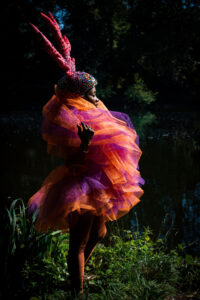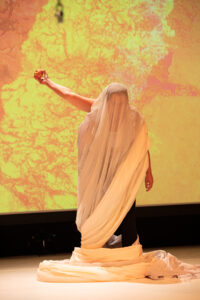GAIA
a Cyborg Opera
On June 27, 2020, the new production GAIA by kainkollektiv will celebrate its premiere. After the pandemic did not allow the originally planned premiere at the Ruhrfestspiele Recklinghausen, it was rethought – together with sputnik – and creatively rescheduled to create an online version with live moments.

“My name is Gaia, mother-goddess of the earth. My name is Demeter, mother-goddess of fertility. And I am Isis, mother-goddess of species. We are not saints, but earth-bound ones. Not spiritual principles but principles made flesh, not heavenly evasions but earthly entanglements. We have come to take back what has always been ours. But take heed, we are not given to joking.” (Excerpt on BITCH MOTHER MANIFESTO)
Gaia in mythology is the primordial Mother Earth, the all-encompassing feminine principle that connects all things that are. Gaia creates and destroys. Gaia gives birth and multiplies.
The 10 female artists from Canada, Cameroon, Iran, Croatia, France and Germany create a space of possibility in GAIA. . A space in which art and children can exist together. In this space they expose themselves with their questions, doubts, strengths and search movements.
A story is told in the near future. A mysterious phenomenon is appearing all over the world: Children fall into a deep sleep. Nobody can explain the reason. In this setting, a group of mothers emerges who interpret this phenomenon in their own unique way. What they have in common: they are (non-) mothers and artists who are fed up with the state of the world. The current crisis makes them reflect on individual choices and life circumstances.
Fictional portraits are drawn that are projections of the artists themselves. Of who they are, of what they (don’t) want to be, of how they feel they are seen, and of how they (don’t) want to be seen. What does it mean to be an artist and a mother?
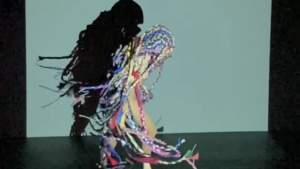
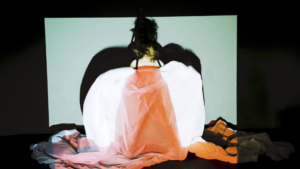
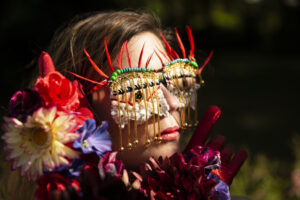
Due to the crisis, the women are tied to their homes, but still connected through the Internet, and so they prepare a fantastic revolution that their BITCH MOTHER MANIFESTO is based on. In the process, they rediscover the arts that have accompanied their lives for so long. Exploring their mystical origins and realizing the transformative power that art can have. In the scenography of their kitchens, bathrooms, beds and living rooms, the women transform themselves into mythical, hybrid, hermaphroditic figures/cyborgs – a new planetary species – that may even have the abilities to awaken the sleeping children and lead them into a future vision of a new world program: GAIA.
In English, French and German.
From and With: Silvia Dierkes, Catherine Jodoin, Edith Voges Nana Tchuninang, Vanessa Chartrand-Rodrigue, Mirjam Schmuck, Sabrina Bohl, Sara Bigdeli Shamloo, Kerstin Pohle, Bianca Künzel, Zdravka Ivandija Kirigin, Hannah Busch
A project of kainkollektiv in coproduction with Ruhrfestspielen Recklinghausen and tak Berlin.

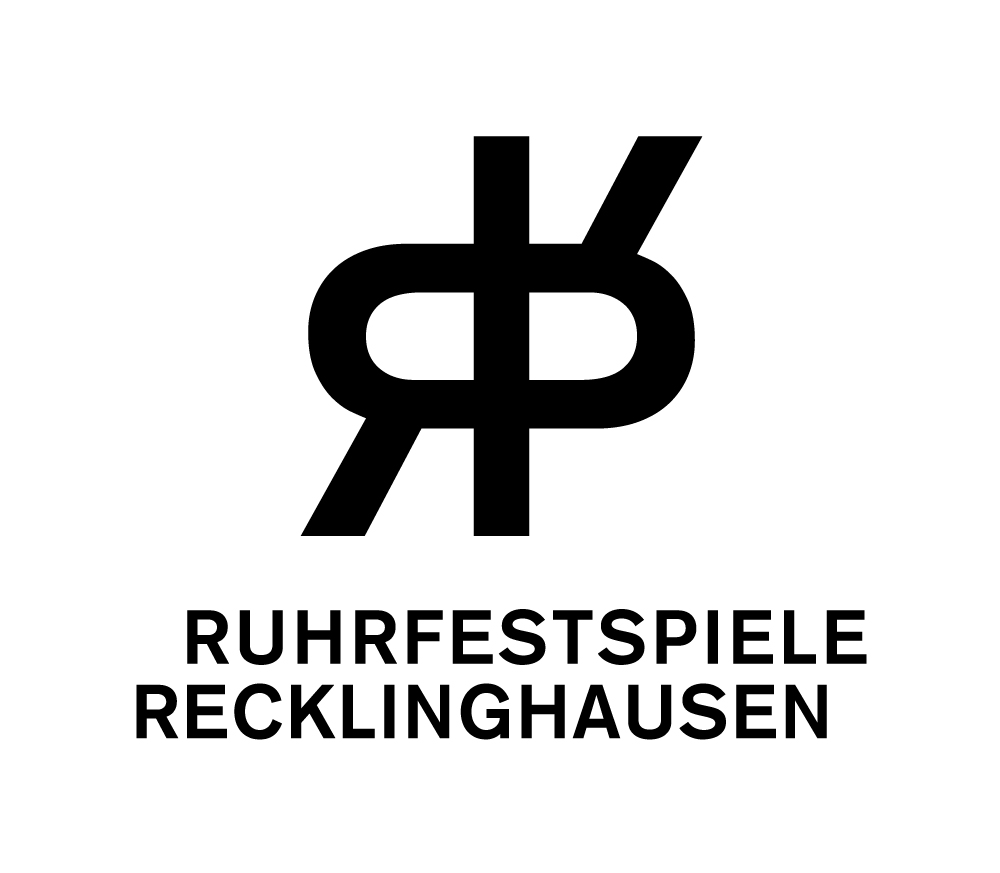
Funded by the Performing Arts Fund, funded by the Federal Government Commissioner for Culture and the Media, the Ministry of Culture and Science of the State of North Rhine-Westphalia, the North Rhine-Westphalia State Office for the Independent Performing Arts, and the Regionalverband Ruhr.


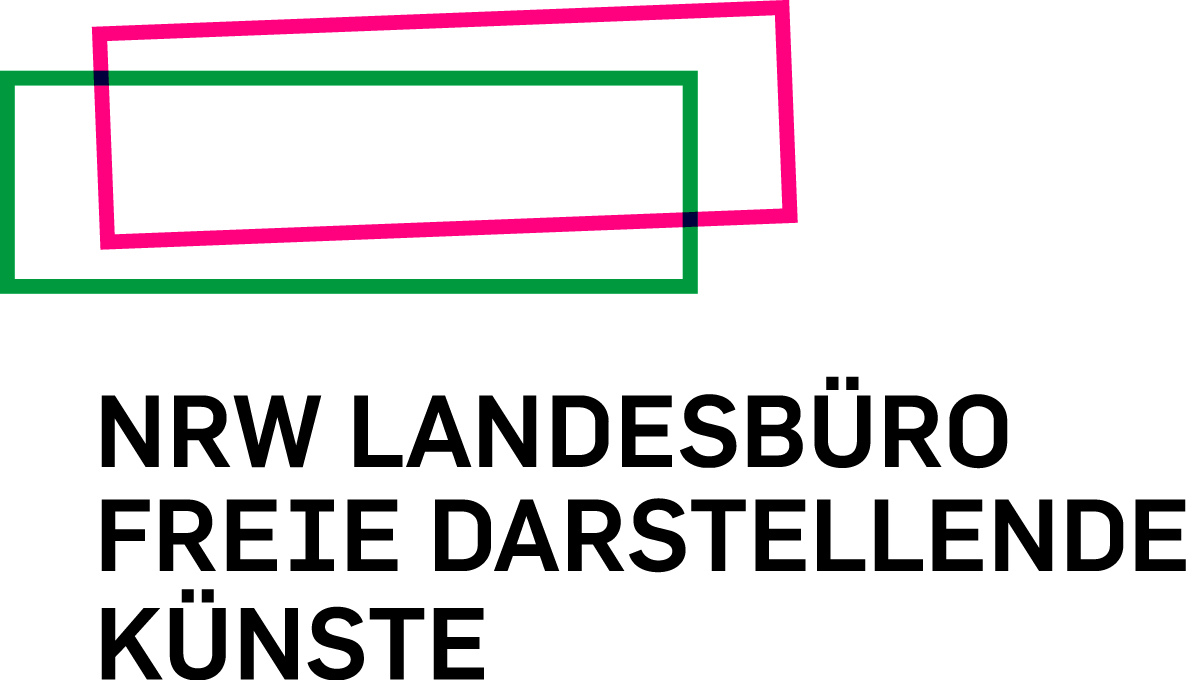

DIE WAND
One morning in the mountains, a woman finds herself cut off from civilization by an invisible wall. The rest of life seems petrified, inaccessible. Only some animals and nature within her suddenly so shrunken world keep her company.
DIE WAND by Marlen Haushofer has long since become a classic that has not lost its relevance today. The ambivalent situation of the main character’s isolation, which means security and threat in equal measure, unfolds a broad spectrum of references ranging from feminist self-empowerment to the current world political situation. Last but not least, DIE WAND conjures up a time after patriarchal, capitalist society.
In an exploration of the novel, the directing team and an ensemble of eleven women have developed a chorus of movement and language that creates a contemporary overwriting of the text. On the border between the individual and the collective, the performers confront their personal “walls.” What leads to the rupture between us and the rest of the world, and what events changed everything from one day to the next? The performers talk about crossing or bumping into geographical and personal boundaries. Of the isolation that can accompany a diagnosis or the loss of a loved one. Some long to break through the wall, others have already left it behind.
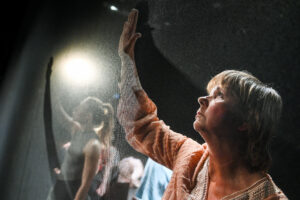
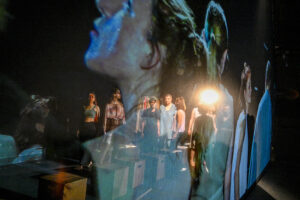
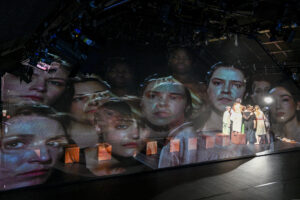
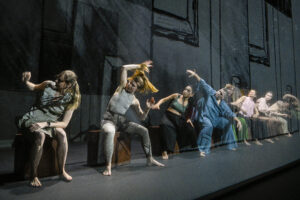
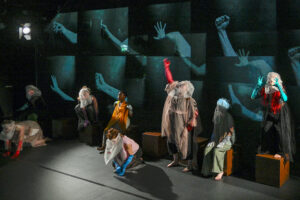
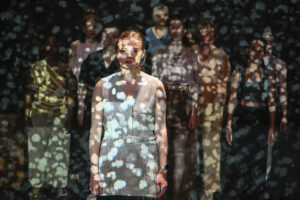
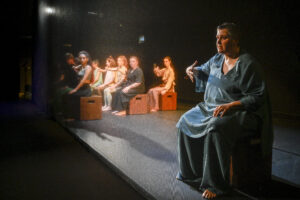
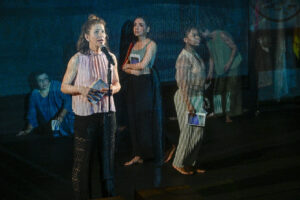
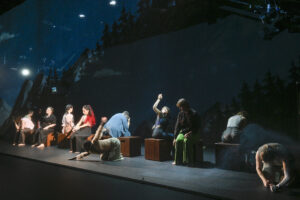
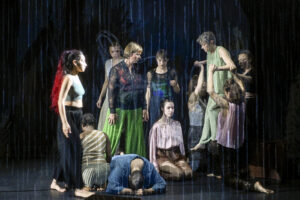
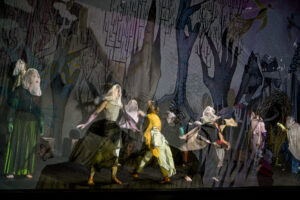
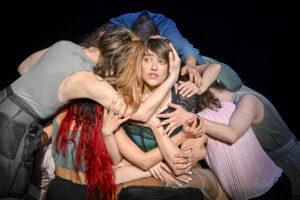
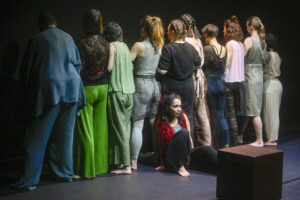
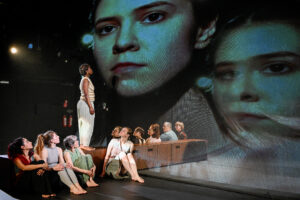
Von und Mit: kainkollektiv (Mirjam Schmuck & Fabian Lettow), Catherine Jodoin, Loxo Harazim, Tommaso Tezzele, Silvia Dierkes, Lena Iversen, Andreas Rösler, Franziska Baumann, Maria Buchmüller, Anni D., Katja Firker, Nina Houshmand, Ida Kranz, Natalia Obkhodskaia, Ute Schellenberg, Thembisile Vilakazi, Barbara Walz-Schneider, Caroline Woderich
A production of Bürgerbühne Dresden and kainkollektiv.
Black Eurydice // Schwarze Eurydike // Eurydice Noire
A Counter-Opera
Upcoming dates
-
25.04.2024 – 20:00kampnagel, Hamburg
-
26.04.2024 – 20:00kampnagel, Hamburg
-
27.04.2024 – 20:00kampnagel, Hamburg
“When Eurydice emerges from the underworld, her eyes are so blinded by the glare of the sun that for a moment, which she cannot say how long it lasts, she can see nothing but BLACK. A black, however, that contains everything: all the colors, all the contours, all the events that are now passing before her inner eye like a film running in fast motion. Just as it is commonly said to be the case at the moment of death, when your entire life passes before your eyes for the last time in a fraction of a second. This is exactly how Eurydice sees everything before her once again. Except that this moment is not her death, but her rebirth…“
(Excerpt from the text of the play)
BLACK EURYDICE, a transnational music theatre production by kainkollektiv, is about the relationship between the European foundation/invention of opera and what was systematically excluded with this foundation: the position of women & the colonial history that began at the same time (around 1600). On the basis of Europe’s first modern opera – Monteverdi’s “Orfeo” (Mantua 1607) – kainkollektiv not only gets to the (under)ground of the aforementioned exclusions, but also designs an (afro-)futuristic, feminist & postcolonial COUNTER-OPERA OF EURYDICE. In “BLACK EURYDICE” five non-European, contemporary women composers – from Iran, Cameroon, South Africa and Canada – have combined Monteverdi’s baroque music from “Orfeo”, considered the first modern opera in Europe, with visionary, contemporary, post-classical and even electronic compositions. A collective feminist composition has created together with kainkollektiv and other European and non-European performers a completely new, multi-voiced vision of the future of music theatre – also and not least as a new questioning of the patriarchal heritage of the cultural institutions of theatre/opera and as an imagination of a different history of its future.
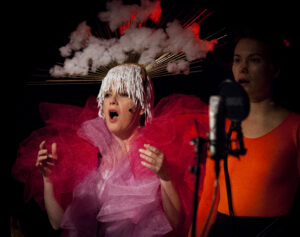
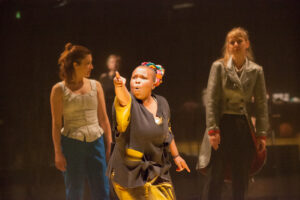
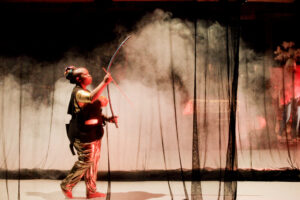
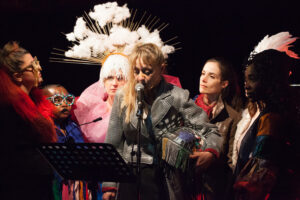
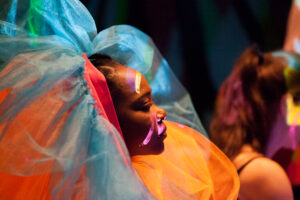
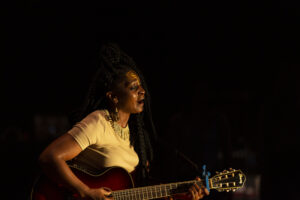
This is in parts visualised in the form of a COMIC OPERA – as a digitally painted and live-performed version of a feminist, docu-fictional “superheroine” story. kainkollektiv’s “superheroine” BLACK EURYDICE, however, is less interested in “saving the world” like her male hero counterparts. Rather, it is about her vision of a transformation of different world experiences.
“The immensely multi-layered, sensually overwhelming music theatre production ‘Black Eurydice’ is a postcolonial, multi-perspectival, feminist counter-draft to the patriarchal, Eurocentric cultural heritage. In around 90 minutes, ‘Black Eurydice’ tells with fabulous playful energy about overcoming the female and non-white silencing in a current parallel universe. However, it is above all an aesthetically highly vivid, blackly ironic musical theatre comic with exciting glimpses of the future.” (Elisabeth Einecke-Klövekorn, Bonn, 17 October 2022)
What other stories can we tell ourselves about the (yesterday’s/tomorrow’s) world that are capable of countering the (colonial) principle of exploitation and destruction that has prevailed for hundreds of years and into our turbo-capitalist present? Perhaps the one that Eurydice brings with her from the underworld, into which she descends silently in Monteverdi’s composition: from the underground, from her shadowy existence, from which we liberate her in BLACK EURYDICE and let her step into the light again. As a polyphonic figure of female experience in a polyphonic interdisciplinary and transnational ensemble of women artists who tell of what happened to Eurydice – from the time of her first forced silencing to our present, in which women’s rights – for example those laid down in the “Istanbul Convention” – are once again being seriously questioned and suspended worldwide. Or as Claudia Hötzendorfer writes in her review of the production in the Rheinische Post: “The message of kainkollektiv from the underworld is clear: society needs a feminine view of the past in order to endure the present and arm itself for the future.”
Languages: German, English & French, with English and German surtitles
From and with: Anelisa Stuurman, Anna Homann, Antje Kuhfeld, Bianca Kunzel, Catherine Jodoin, Edith Voges Nana Tchuninang, Fabian Lettow, Hannah Busch, Henning Streck, Immanuel Bartz, Kerstin Pohle, Melissa Muller, Mirjam Schmuck, Nima Aghiani, Pélagie Alima, Richard Behrens, Sarah Bigdeli Shamloo, Silvia Dierkes, Vanessa Chartrand-Rodrigue, Zdravka Ivandija Kirigin
Funded by the Hauptstadtkulturfonds, the Kunststiftung NRW, the Ministry of Culture and Science of the State of North Rhine-Westphalia and the City of Bochum. A project by kainkollektiv in co-production with tak Berlin and FFT Düsseldorf. A project by kainkollektiv in coproduction with tak Berlin and FFT Düsseldorf.

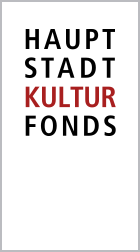



KASSIA – SONGS OF CARE(VOLUTION)
EINE CYBORG OPER
von kainkollektiv, Burak Özdemir & Musica Sequenza, Gendermuseum Istanbul, Ringlokschuppen Ruhr, tak Theater Aufbau Kreuzberg Berlin & Kampnagel Hamburg
Die Komponistin, Dichterin & byzantinische Äbtissin KASSIA, die im 9. Jahrhundert in Konstantinopel lebte, gilt als erste europäische Komponistin, deren musikalische Werke überliefert worden sind und bis heute eine wichtige musikgeschichtliche Rolle spielen. Zudem gründete Kassia auf einem der sieben Hügel Istanbuls ein Frauenkloster, nachdem sie einen Heiratsantrag des Kaisers Theophilos zurückgewiesen hatte. Kassia erscheint damit als eine Art urfeministisches Role Model. Diese „Powerfrau“ nehmen kainkollektiv und der türkisch-deutsche Komponist Burak Özdemir zusammen mit seinem grandiosen Barockorchester Musica Sequenza als Ausgangspunkt für eine (post-)feministische Oper – den SONGS OF CARE(VOLUTION) –, die in Zusammenarbeit mit dem Gendermuseum Istanbul sowie Wissenschaftler*innen, Aktivist*innen und Künstler*innen aus Deutschland, Polen, der Türkei und weiteren Ländern zwischen NRW, Berlin und Istanbul entstanden ist.
Grundlage für die von kainkollektiv inszenierte Performance-Oper bildet die vielschichtige Neu-Komposition der Werke Kassias durch Burak Özdemir und sein Orchester Musica Sequenza, in der die extrem alten, kulturelle und geographische (Klang-)Grenzen überschreitenden Werke Kassias mit alten (und elektronischen) Instrumenten auf eine zeitgenössische Weise völlig neu interpretiert und für unsere Gegenwart zugänglich gemacht werden. Zusammen mit der guatemaltekischen Sopranistin Diana Ramirez, der südkoreanischen Tänzerin Young-Won Song & der kanadischen Tänzerin Catherine Jodoin sowie der syrischen Schauspielerin Amal Omran entsteht zwischen Musik, Oper, Text, Tanz, Film und Performance ein schillerndes Porträt der Künstlerin Kassia ebenso wie der west-östlichen Grenzlandschaften Europas, aus denen sich ihre musikalischen Einflüsse speisten und die aktuell wieder tief in die Krise patriarchaler und nationaler Politiken geraten sind. In einer Zeit, in der die Regierungen in Polen und der Türkei die Istanbul Kovention für Frauenrechte in Europa verlassen, geht es darum, das Vermächtnis Kassias als „erster feminstischer Künstlerin“ neu zu befragen und für die Zukunft auszuloten.
Im Aufgreifen, Übermalen und Weiterspinnen der Kompositionen, Dichtungen sowie der Biografie von KASSIA werden das Musiktheater und die Künstlichkeit der Oper, die selbst eine Art Cyborg-Gattung des Theaters ist und Cyborg-Künstler*innen mit außergewöhnlichen Stimmen und Körpern hervorbringt, zum produktiven Raum der Erforschung hybrider, mithin queerer, cyborghafter Existenzen und ihrer unterschiedlichen Verkoppelungen – über Zeiten, Räume, Sprachen und Klangwelten hinweg, von Byzanz bis in die (europäische) Gegenwart und Zukunft. Denn die neue CYBORG OPERAS Serie von kainkollektiv, die sich hier mit KASSIA fortsetzt, verfolgt das Erzeugen eines Repertoires an theatralen Gesten, narrativen Dramaturgien und insbesondere Liedern, Arien, Gesängen, Lauten und Schreien – jenen SONGS OF CARE –, die neben allen singulären Ausdrucksformen auch stets die Stelle markieren, an der die Einzelnen mit ihren Umwelten verbunden sind und sich neue, mithin kosmische Konfigurationen ergeben – so wie es in den kosmologisch-theologischen Entwürfen und Kompositionen Kassias schon vor mehr als 1.000 Jahren zum Ausdruck gekommen ist und deren Wiederentdeckung darum heute mehr denn je lohnen: Wie klingt eigentlich (post-)feministische Oper?
Susu/Kassia:
I have questions: To write or not to write? To sing or not to sing? Questions that can be heard in our ears. How and why to write poems, plays, songs in revolutionary times? In times of crisis? In times of oppression? Why poems, what songs, when women are silenced? When children are silenced? When animals, plants, stones, dreams are silenced? When does silence begin? When do we escape the silence? When is silence stone, sand, gold, breath?
For silence, like darkness, just is. But how can it be conveyed?
When? It takes time, times, all times. A time to fight. A time to write. And a time in between that combines the two. [Auszug aus dem Stücktext von kainkollektiv]
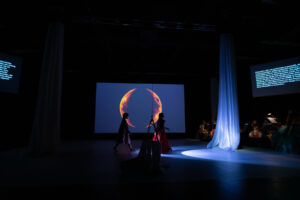
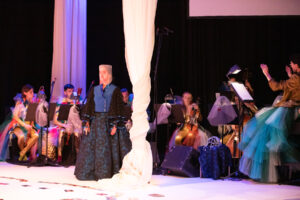
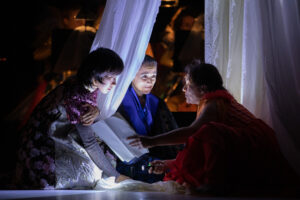
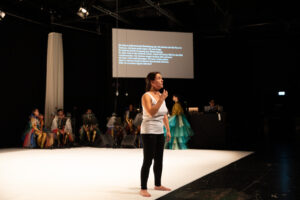
Von und mit: Alexander De Tey, Amal Omran, Annie Gard, Ana Mikulić, Burak Özdemir, Burcu Özdemir, Catherine Joidon, Chang Yoo, Diana Ramirez, Elisabeth Champollion, Emine Schmuck, Fabian Lettow, Hannah Busch, Jochen Röth, Linda Mantcheva, Melissa Müller, Mirjam Schmuck, Norbert Wahren, Pedro Doria, Sebastian Flaig, Theo Small, Tung-Han Hu, Young-Won Song und Zdravka Ivandija Kirigin u.v.m.

Koproduzent*innen und Gastspiele: kainkollektiv, Burak Özdemir/Musica Sequenza Orchestra, Gender Museum Istanbul, Pracownia Kuratorska, Ringlokschuppen Ruhr, kampnagel Hamburg, tak Theater Aufbau Kreuzberg und Theater im Ballsaal Bonn.






Gefördert von der Kunststiftung NRW, dem Ministerium für Kultur und Wissenschaft des Landes Nordrhein-Westfalen, der Heinrich-Böll-Stiftung, vom Fonds Darstellende Künste aus Mitteln der Beauftragten der Bundesregierung für Kultur und Medien, dem NRW KULTURsekretariat, der Stadt Bochum
